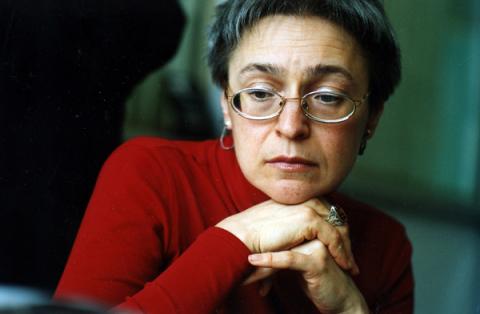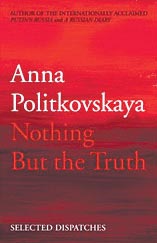Anna Politkovskaya: The Crusader

Nearly four years after the murder of the renowned Russian journalist Anna Politkovskaya we can at least gain a better understanding of the intense dedication that motivated her. By Edward O'Hare
Politkovskaya was the great chronicler of the crimes perpetrated by the Russian state. From the plight of those whose lives were devastated by Russia’s brutal military activities to the testimonies of the victims of its corrupt government authorities, Politkovskaya was determined to provide a mouthpiece for everyone who had suffered at the hands of Vladimir Putin.
It is a testament to how much Politkovskaya kept alive the issue of Russia’s human rights abuses that, since her death in October 2006, it has almost completely disappeared from the international agenda. One can only hope that the publication of Nothing but the Truth, the last collection of her dispatches, will refocus world attention on the monstrous events that have taken place in post-Soviet Russia.
(Picture: Anna Politkovskaya)
One of Putin’s greatest criminal acts, in Politkovskaya’s opinion, was to turn Russian society into a circus tent in which the media was expected to do nothing but entertain the masses. Putin had established what she called a pyramid of power which crushed almost all possibility of free-speech. Politkovskaya’s defiance of this regime saw her branded as a manipulator of people and events bent on making a name for herself abroad.
The clarity of the articles in Nothing but the Truth, the absolute precision with which Politkovskaya investigates different affairs and the conviction with which she presents her findings proves once again what nonsense these accusations were. The bulk of the material contained in Nothing but the Truth concerns the same conflict which preoccupied Politkovskaya: the war in Chechnya.
When the second Chechen war broke out in October 1999 she returned to the ravaged region, leaving behind her young family. Hindered from the outset by state authorities (who laughably accused her of disturbing the peace) and a minefield of disinformation, Politkovskaya fought to bring to light the atrocities committed by Russian forces. These were the ‘security sweeps’ which saw the abduction, torture and murder of thousands of Chechens.
This situation accelerated following the attacks of September 11th, when Putin took advantage of the global fear of terrorism to commit genocide in Chechnya. Writing for the Novaya Gazeta, the last Russian newspaper not under state control, Politkovskaya took up the cause of the countless Chechens who had been left with no knowledge of what had become of their loved ones. She relentlessly pursued those responsible for outrages and was pivotal in getting several imprisoned.
Politkovskaya’s fearless writing on Chechnya makes for extremely harrowing reading but what keeps you involved is the exceptional quality of her reportage, the way she always asks the right questions, how she penetrates a mask of bureaucracy concealing unbelievable inhumanity, and her ability to find the story of an individual that speaks for thousands.
Equally as disturbing as Politkovskaya’s reports from Chechnya is her vision of Putin’s Russia, a state where the government, its administration and security forces have engendered what she terms “monolithic” corruption.
This is a 21st century society where politicians ‘wallow in luxury’ while whole families live in single rooms in abandoned buildings. This is a country where only a tiny percentage of the population receives a basic education, where you must illegally acquire medicines and bring them to a hospital if you need treatment and where thousands of people over 80 still do menial jobs to survive.
Self-expression is a dead concept when government hit-men are a common sight on the streets. Politkovskaya explains that her goal as a journalist was to “describe life for those citizens who could not see it for themselves” and what dominated her view of things was “the totalitarian empire being constructed in front of us.”
Nothing but the Truth exposes Vladimir Putin as one of the greatest tyrants active in recent times. Politkovskaya’s investigations prove that the siege in a Moscow theatre in 2002 and the Beslan hostage crisis in 2004 were both ‘stage managed’ by figures acting on his instruction and shows how he used the anti-Chechen sentiment these generated to keep himself in power.
But there are other villains.
Politkovskaya accuses Kofi Annan of remaining ‘disgracefully silent’ on the issue of Chechnya during his tenure as UN Secretary General while Tony Blair sidesteps the question of why he, like many other so-called defenders of justice, should be on such good terms with a virtual dictator like Putin. “It’s my job to like Mr. Putin” was the smug answer Politkovskaya received.
Overall, only Amnesty International seems to had taken any interest in Russia’s crimes. Anna Politkovskaya’s murder must have come as no surprise to those who knew her well. So many of those she had worked with, journalists, lawyers, intellectuals, had already paid the ultimate price that she must have known that the same fate awaited her if she persisted.
She had already cheated death when Russian secret service agents poisoned her on her way to Beslan two years earlier. What meant everything to Politkovskaya was the all-important contact she had established between the ordinary people of Russia and the wider world.
It is our responsibility, now that she is dead, to put pressure on our leaders to ensure that these people continue to be heard.

Nothing but the Truth: Selected Dispatches by Anna Politkovskaya
Translated from Russian by Arch Tait
Harvill Secker EURO 22
